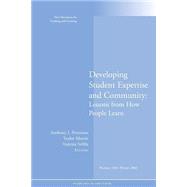
Note: Supplemental materials are not guaranteed with Rental or Used book purchases.
Purchase Benefits
Looking to rent a book? Rent Developing Student Expertise and Community: Lessons from How People Learn New Directions for Teaching and Learning, Number 108 [ISBN: 9780787995744] for the semester, quarter, and short term or search our site for other textbooks by Petrosino, Anthony J.; Martin, Taylor; Svihla, Vanessa. Renting a textbook can save you up to 90% from the cost of buying.
| Editorsa?? | |
| Notes | |
| Communities Of Practice | |
| The Emergence of a Community of Practice in Engineering Education (Yifat Ben-David Kolikant, Ann McKenna, Bugrahan Yalvac) This chapter explores how engineering faculty and learning scientists developed a collective wisdom in order to work together to develop course materials | |
| Desegregated Learning: An Innovative Framework for Programs of Study (Arturo A. Fuentes, Robert Freeman, Stephen Crown, Javier Kypuros, Hashim Mahdi) Too often courses exist in a vacuum, with the learning segregated into small units. This chapter discusses the effort of one group to "desegregate" their curriculum into a flow of integrated learning experiences | |
| Taking Content Seriously In Learning Science Research | |
| The Development of Adaptive Expertise in Biotransport (Taylor Martin, Anthony J. Petrosino, Stephanie Rivale, Kenneth R. Diller) The authors describe how they studied a biotransport course as a mechanism for continuous development of adaptive expertise, the ability of students to use their knowledge creatively and flexibly | |
| Establishing Experiences to Develop a Wisdom of Professional Practice (Joan M. T. Walker, Sean P. Brophy, Lynn Liao Hodge, John D. Bransford) The authors compare the performance of first-year and senior studentsa?? perceptions of two types of instructional material focused on professionalism, with an eye toward understanding how materials may be tailored to meet the needs of first-year and advanced undergraduates | |
| Teaching Writing in a Laboratory-Based Engineering Course with a "How People Learn" Framework (Bugrahan Yalvac, H. David Smith, Penny L. Hirsch, G??lnur Birol) This chapter discusses the effectiveness of a "How People Learn" framework used in a laboratory-based module designed to improve studentsa?? written communication skills without compromising acquisition of content knowledge | |
| Applying The Model To Other Populations | |
| Learning Content Using Complex Data in Project-Based Science: An Example from High School Biology in Urban Classrooms (David E. Kanter, Melissa Schreck) The authors explore the extent to which project-based science can help students make sense of complex scientific data and promote deep understanding | |
| The Effect of a Bioengineering Unit Across High School Contexts: An Initial Investigation in Urban, Suburban, and Rural Domains (Stacy S. Klein, Melissa J. Geist) The authors discuss the degree to which innovative curricula such as those developed in the VaNTH project are effective with students in different situations | |
| Educational Research In University Settings | |
| Implementing Learning-Science Research in University Settings: New Research Opportunities | |
| Index | |
| Table of Contents provided by Publisher. All Rights Reserved. |
The New copy of this book will include any supplemental materials advertised. Please check the title of the book to determine if it should include any access cards, study guides, lab manuals, CDs, etc.
The Used, Rental and eBook copies of this book are not guaranteed to include any supplemental materials. Typically, only the book itself is included. This is true even if the title states it includes any access cards, study guides, lab manuals, CDs, etc.